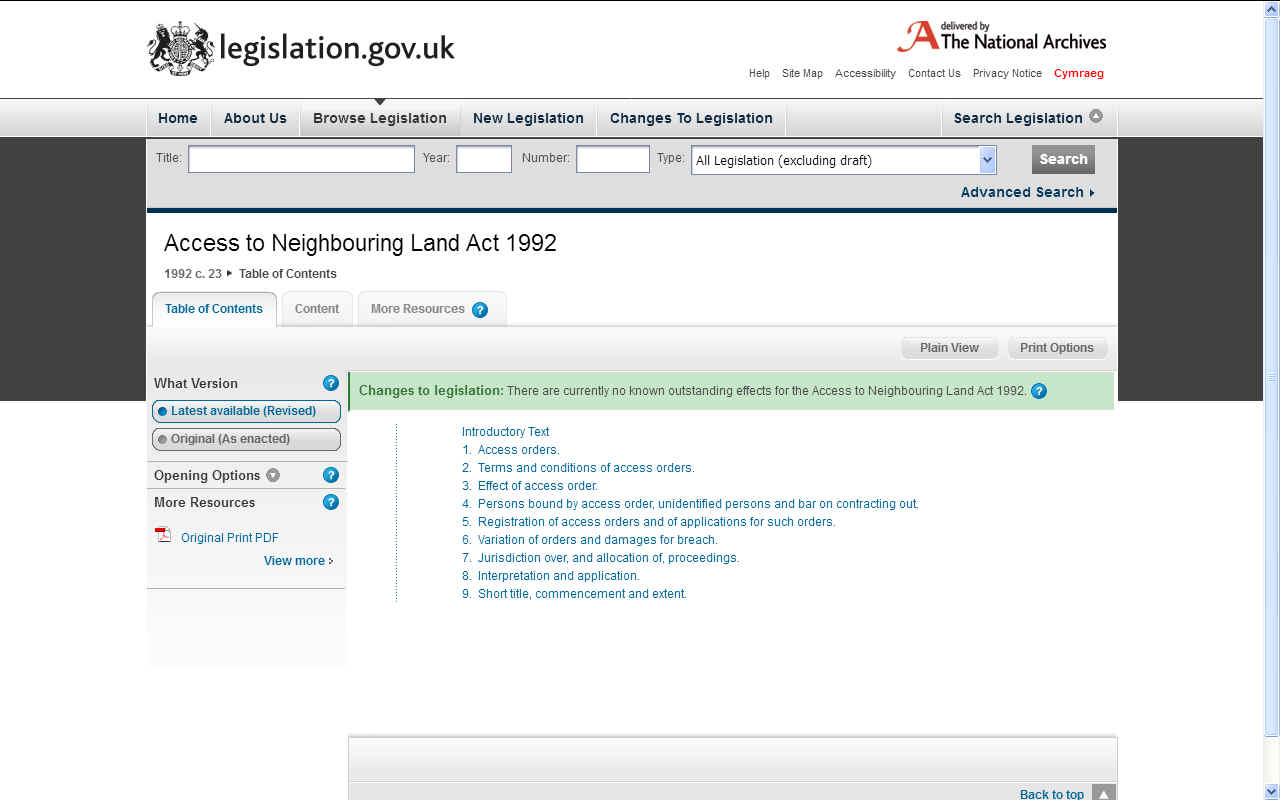|

Most
people will not have to concern
themselves with this Act, if they have a decent relationship with their neighbours. From time to time,
most people will have to repair or replace things on their property which might require
themselves or their workers carrying out work on their behalf, to gain access to
a neighbour’s land in order to resolve the problem.
Generally, it’s a simple matter of letting your neighbour know what work you’re intending to carry out and to ask their permission if you can Gain Access Their Land
in order to conduct the work and to arrange a suitable time.
Regardless
of what is normal, disputes can arise or you might just not get on with your neighbour, and both of these issues can make it difficult to carry out the work.
This is where the Access to Neighbouring Land Act 1992 can facilitate matters in some cases, if you need to resort to a more formal solution.
With this in mind and for those with the most obstructive
neighbours, it’s good to know your rights with regard to this matter, what the Act covers
and just as crucially, what it doesn’t.
YOUR RIGHTS
In order to grant an access order the court must be convinced that the reasons you need to gain access to a neighbour’s land, if they have been flatly refused permission, are valid as contained within the Act. Valid reasons for granting an access order would include:
* The maintenance, renovation or repair of a property (or parts of it) in order to preserve it
* The clearing or repair of any sewers, drains, cables or pipes
* The removal or filling in of a ditch
* The felling of a tree, plant or hedge (or parts of it) which have died, become diseased or which have become insecurely rooted and unstable which is likely to pose a danger
The basic interpretation of the law here is that the work must relate to the ‘preservation’ of an existing structure as opposed to granting permission to gain access to a neighbour’s land in order to make it easier to construct a new development, such as a new conservatory or extension.
The Court will not generally grant an Access Order if granting access to the neighbouring land would result in:
* An interference with, or disturbance of the neighbour’s enjoyment of their land
* The neighbour suffering hardship, and to such a degree that notwithstanding any term or condition that my be imposed with the Access Order, it would be unreasonable to make an Access Order.
We always reiterate the importance of taking all steps to maintain a good relationship with owners of neighbouring land, sometimes this may not be possible. It is important to ensure you are aware of your rights and, if required, can draw on the necessary legal support to enforce those practical entitlements if and when required.
In
some cases the Party Wall Act may be more applicable, as in the case of
the Old Rectory in Herstmonceux, where notice must be given and
surveyors instructed, with compensation payable for any inconvenience or
structural alterations, such as underpinning.
Therefore, even if you have been granted planning permission for a ‘new build’, this does NOT mean that you can automatically gain access to a neighbour’s land if parts of the work need to be carried out from their side of the Boundary Line. That is not covered by the Act and any such work in this instance would have to be agreed to by both you and your neighbours.
It pays then to work together to resolve issues if at all possible.
In
a small village in Sussex a semi-feud situation developed where the
residents in a private park ganged up on the occupier of a historic
building, working with a corrupt council to deceive planning inspectors
and even high court judges.

CUT
OUT THE MIDDLE MAN - Going to a direct access barrister for legal advice and representation (without having to appoint a solicitor first) can mean enormous benefits for you in terms of time and cost-saving.
The Public Access Scheme now allows you to instruct a direct access barrister anywhere in England and Wales. The barrister will act for you in court and/or provide you with expert advice by way of a legal opinion.
Nowadays, many direct access barristers (from junior to senior levels, including Queens Counsel (QC) barristers, also known as ‘Silks’), are qualified to take direct instructions form you, and assist you with your legal matter.
To hire a barrister, you need to first figure out which one is best for you. There are literally thousands of direct access barristers out there, and you need to make sure the barrister you choose has the right experience and track record of delivering the results you need.
Also, you need to make sure that their fees will be fair for what you get. You don’t want to end up paying too much and getting too little in return. To get the right direct access barrister, make sure you get a proper recommendation from someone who knows the barrister’s service quality and advocacy style (e.g. are they strong, forceful and/or shrewd and cunning). It is also important to have a clear understanding whether a barrister has experience in your type of case and whether they have dealt with your opponent (or someone like them) previously.
ACCESS
TO NEIGHBOURING LAND ACT 1992 - 1992 CHAPTER 23
[16th March 1992]
An Act to enable persons who desire to carry out works to any land which are reasonably necessary for the preservation of that land to obtain access to neighbouring land in order to do so; and for purposes connected therewith.
Be it enacted by the Queen’s most Excellent Majesty, by and with the advice and consent of the Lords Spiritual and Temporal, and Commons, in this present Parliament assembled, and by the authority of the same, as follows:—
1 Access orders.
(1) A person—
(a) who, for the purpose of carrying out works to any land (the “dominant land”), desires to enter upon any adjoining or adjacent land (the “servient land”), and
(b) who needs, but does not have, the consent of some other person to that entry,
may make an application to the court for an order under this section (“an access order”) against that other person.
(2) On an application under this section, the court shall make an access order if, and only if, it is satisfied—
(a) that the works are reasonably necessary for the preservation of the whole or any part of the dominant land; and
(b) that they cannot be carried out, or would be substantially more difficult to carry out, without entry upon the servient land;
but this subsection is subject to subsection (3) below.
(3) The court shall not make an access order in any case where it is satisfied that, were it to make such an order—
(a) the respondent or any other person would suffer interference with, or disturbance of, his use or enjoyment of the servient land, or
(b) the respondent, or any other person (whether of full age or capacity or not) in occupation of the whole or any part of the servient land, would suffer hardship,
to such a degree by reason of the entry (notwithstanding any requirement of this Act or any term or condition that may be imposed under it) that it would be unreasonable to make the order.
(4) Where the court is satisfied on an application under this section that it is reasonably necessary to carry out any basic preservation works to the dominant land, those works shall be taken for the purposes of this Act to be reasonably necessary for the preservation of the land; and in this subsection “basic preservation works” means any of the following, that is to say—
(a) the maintenance, repair or renewal of any part of a building or other structure comprised in, or situate on, the dominant land;
(b) the clearance, repair or renewal of any drain, sewer, pipe or cable so comprised or situate;
(c) the treatment, cutting back, felling, removal or replacement of any hedge, tree, shrub or other growing thing which is so comprised and which is, or is in danger of becoming, damaged, diseased, dangerous, insecurely rooted or dead;
(d) the filling in, or clearance, of any ditch so comprised;
but this subsection is without prejudice to the generality of the works which may, apart from it, be regarded by the court as reasonably necessary for the preservation of any land.
(5) If the court considers it fair and reasonable in all the circumstances of the case, works may be regarded for the purposes of this Act as being reasonably necessary for the preservation of any land (or, for the purposes of subsection (4) above, as being basic preservation works which it is reasonably necessary to carry out to any land) notwithstanding that the works incidentally involve—
(a) the making of some alteration, adjustment or improvement to the land, or
(b) the demolition of the whole or any part of a building or structure comprised in or situate upon the land.
(6) Where any works are reasonably necessary for the preservation of the whole or any part of the dominant land, the doing to the dominant land of anything which is requisite for, incidental to, or consequential on, the carrying out of those works shall be treated for the purposes of this Act as the carrying out of works which are reasonably necessary for the preservation of that land; and references in this Act to works, or to the carrying out of works, shall be construed accordingly.
(7) Without prejudice to the generality of subsection (6) above, if it is reasonably necessary for a person to inspect the dominant land—
(a) for the purpose of ascertaining whether any works may be reasonably necessary for the preservation of the whole or any part of that land,
(b) for the purpose of making any map or plan, or ascertaining the course of any drain, sewer, pipe or cable, in preparation for, or otherwise in connection with, the carrying out of works which are so reasonably necessary, or
(c) otherwise in connection with the carrying out of any such works,
the making of such an inspection shall be taken for the purposes of this Act to be the carrying out to the dominant land of works which are reasonably necessary for the preservation of that land; and references in this Act to works, or to the carrying out of works, shall be construed accordingly.
2 Terms and conditions of access orders.
(1) An access order shall specify—
(a) the works to the dominant land that may be carried out by entering upon the servient land in pursuance of the order;
(b) the particular area of servient land that may be entered upon by virtue of the order for the purpose of carrying out those works to the dominant land; and
(c) the date on which, or the period during which, the land may be so entered upon;
and in the following provisions of this Act any reference to the servient land is a reference to the area specified in the order in pursuance of paragraph (b) above.
(2) An access order may impose upon the applicant or the respondent such terms and conditions as appear to the court to be reasonably necessary for the purpose of avoiding or restricting—
(a) any loss, damage, or injury which might otherwise be caused to the respondent or any other person by reason of the entry authorised by the order; or
(b)any inconvenience or loss of privacy that might otherwise be so caused to the respondent or any other person.
(3)Without prejudice to the generality of subsection (2) above, the terms and conditions which may be imposed under that subsection include provisions with respect to—
(a) the manner in which the specified works are to be carried out;
(b) the days on which, and the hours between which, the work involved may be executed;
(c) the persons who may undertake the carrying out of the specified works or enter upon the servient land under or by virtue of the order;
(d) the taking of any such precautions by the applicant as may be specified in the order.
(4) An access order may also impose terms and conditions—
(a) requiring the applicant to pay, or to secure that such person connected with him as may be specified in the order pays, compensation for—
(i) any loss, damage or injury, or
(ii) any substantial loss of privacy or other substantial inconvenience,
which will, or might, be caused to the respondent or any other person by reason of the entry authorised by the order;
(b) requiring the applicant to secure that he, or such person connected with him as may be specified in the order, is insured against any such risks as may be so specified; or
(c) requiring such a record to be made of the condition of the servient land, or of such part of it as may be so specified, as the court may consider expedient with a view to facilitating the determination of any question that may arise concerning damage to that land.
(5) An access order may include provision requiring the applicant to pay the respondent such sum by way of consideration for the privilege of entering the servient land in pursuance of the order as appears to the court to be fair and reasonable having regard to all the circumstances of the case, including, in particular—
(a) the likely financial advantage of the order to the applicant and any persons connected with him; and
(b) the degree of inconvenience likely to be caused to the respondent or any other person by the entry;
but no payment shall be ordered under this subsection if and to the extent that the works which the applicant desires to carry out by means of the entry are works to residential land.
(6)For the purposes of subsection (5)(a) above, the likely financial advantage of an access order to the applicant and any persons connected with him shall in all cases be taken to be a sum of money equal to the greater of the following amounts, that is to
say —
(a) the amount (if any) by which so much of any likely increase in the value of any
land —
(i) which consists of or includes the dominant land, and
(ii) which is owned or occupied by the same person as the dominant land,
as may reasonably be regarded as attributable to the carrying out of the specified works exceeds the likely cost of carrying out those works with the benefit of the access order; and
(b) the difference (if it would have been possible to carry out the specified works without entering upon the servient land)
between —
(i) the likely cost of carrying out those works without entering upon the servient land; and
(ii) the likely cost of carrying them out with the benefit of the access order.
(7) For the purposes of subsection (5) above, “residential land” means so much of any land as consists
of —
(a) a dwelling or part of a dwelling;
(b) a garden, yard, private garage or outbuilding which is used and enjoyed wholly or mainly with a dwelling; or
(c) in the case of a building which includes one or more dwellings, any part of the building which is used and enjoyed wholly or mainly with those dwellings or any of them.
(8) The persons who are to be regarded for the purposes of this section as “connected with” the applicant
are —
(a) the owner of any estate or interest in, or right over, the whole or any part of the dominant land;
(b) the occupier of the whole or any part of the dominant land; and
(c) any person whom the applicant may authorise under section 3(7) below to exercise the power of entry conferred by the access order.
(9) The court may make provision —
(a) for the reimbursement by the applicant of any expenses reasonably incurred by the respondent in connection with the application which are not otherwise recoverable as costs;
(b) for the giving of security by the applicant for any sum that might become payable to the respondent or any other person by virtue of this section or section 3 below.
3 Effect of access order.
(1) An access order requires the respondent, so far as he has power to do so, to permit the applicant or any of his associates to do anything which the applicant or associate is authorised or required to do under or by virtue of the order or this section.
(2) Except as otherwise provided by or under this Act, an access order authorises the applicant or any of his associates, without the consent of the respondent,—
(a) to enter upon the servient land for the purpose of carrying out the specified works;
(b) to bring on to that land, leave there during the period permitted by the order and, before the end of that period, remove, such materials, plant and equipment as are reasonably necessary for the carrying out of those works; and
(c) to bring on to that land any waste arising from the carrying out of those works, if it is reasonably necessary to do so in the course of removing it from the dominant land;
but nothing in this Act or in any access order shall authorise the applicant or any of his associates to leave anything in, on or over the servient land (otherwise than in discharge of their duty to make good that land) after their entry for the purpose of carrying out works to the dominant land ceases to be authorised under or by virtue of the order.
(3) An access order requires the applicant—
(a) to secure that any waste arising from the carrying out of the specified works is removed from the servient land forthwith;
(b) to secure that, before the entry ceases to be authorised under or by virtue of the order, the servient land is, so far as reasonably practicable, made good; and
(c) to indemnify the respondent against any damage which may be caused to the servient land or any goods by the applicant or any of his associates which would not have been so caused had the order not been made;
but this subsection is subject to subsections (4) and (5) below.
(4) In making an access order, the court may vary or exclude, in whole or in part,—
(a) any authorisation that would otherwise be conferred by subsection (2)(b) or (c) above; or
(b) any requirement that would otherwise be imposed by subsection (3) above.
(5) Without prejudice to the generality of subsection (4) above, if the court is satisfied that it is reasonably necessary for any such waste as may arise from the carrying out of the specified works to be left on the servient land for some period before removal, the access order may, in place of subsection (3)(a) above, include provision—
(a) authorising the waste to be left on that land for such period as may be permitted by the order; and
(b) requiring the applicant to secure that the waste is removed before the end of that period.
(6) Where the applicant or any of his associates is authorised or required under or by virtue of an access order or this section to enter, or do any other thing, upon the servient land, he shall not (as respects that access order) be taken to be a trespasser from the beginning on account of his, or any other person’s, subsequent conduct.
(7) For the purposes of this section, the applicant’s “associates” are such number of persons (whether or not servants or agents of his) whom he may reasonably authorise under this subsection to exercise the power of entry conferred by the access order as may be reasonably necessary for carrying out the specified works.
6 Variation of orders and damages for breach.
(1) Where an access order or an order under this subsection has been made, the court may, on the application of any party to the proceedings in which the order was made or of any other person on whom the order is
binding —
(a) discharge or vary the order or any of its terms or conditions;
(b) suspend any of its terms or conditions; or
(c) revive any term or condition suspended under paragraph (b) above;
and in the application of subsections (1) and (2) of section 4 above in relation to an access order, any order under this subsection which relates to the access order shall be treated for the purposes of those subsections as included in the access order.
(2) If any person contravenes or fails to comply with any requirement, term or condition imposed upon him by or under this Act, the court may, without prejudice to any other remedy available, make an order for the payment of damages by him to any other person affected by the contravention or failure who makes an application for relief under this subsection.

NCSC
ROYAL OPENING - Her Majesty The Queen opened the NCSC on the 17th of
February 2017. There are several agencies in the UK that are supposed to
tackle fraud, cyber crime, drugs, sex trafficking and money laundering,
but when you ask any one of them to take a look at corruption in Wealden-land, they don't appear too anxious to open a case file. It's
more a case of pass the buck .... and keep passing it ... until the
complainant fades away. Sorry to have to report this to you Your
Majesty, but it is the truth the whole truth and nothing but the truth -
so help me God.
WHERE
IS THE FINANCIAL GAIN
What is the motive for Wealden's officers and/or members to help in the
preparation of fraudulent statements for any enforcement action, appeal
or public enquiry - and then to lie on oath?
The
incentive is to gain employment and curry favour with influential
members of the public, hence, obtain a wage or salary on the
basis of keeping the truth hidden from the public. Not only that, but
typically on retirement there will be an enhanced pension for keeping
quiet about the corruption that officers and members may have been
party to.
Make
no mistake that doing favours for prominent citizens to disadvantage the
less fortunate is illegal. What amounts to bribery to remain silent qualifies as proceeds
of crime against which all the usual remedies apply such as seizure
of property and cash in the officer or members bank accounts.

These
are some of the police chiefs in the United
Kingdom who will not prosecute officer and/or members of any Council
for wrong doing. Why? The only reason we can think of is that they might
be implicated.




Victorio
Patrick Scarpa, Christine Nuttall, David Phillips & Charles (Charlie) Lant



Kelvin
Williams, J. Douglas Moss and Ian M. Kay
The
above officers were directly or indirectly implicated in a conspiracy to
deny the history attaching to the old generating works in Herstmonceux,
or otherwise tried to assist the directors of Lime
Park Estate Limited.
WHY NOT EMAIL A COUNCILOR TO HAVE YOUR SAY ABOUT ANY ACCESS ISSUE?
cllr.susan.stedman@wealden.gov.uk
cllr.stuart.towner@wealden.gov.uk
cllr.stephen.shing@wealden.gov.uk
cllr.ron.cussons@wealden.gov.uk
cllr.raymond.cade@wealden.gov.uk
cllr.nigel.mckeeman@wealden.gov.uk
cllr.lin.clark@wealden.gov.uk
cllr.john.blake@wealden.gov.uk
cllr.jan.dunk@wealden.gov.uk
cllr.dick.angel@wealden.gov.uk
cllr.dianne.dear@wealden.gov.uk
cllr.david.white@wealden.gov.uk
daniel.shing@wealden.gov.uk
cllr.chris.hardy@wealden.gov.uk
cllr.chriss.triandafyllou@wealden.gov.uk
cllr.charles.peck@wealden.gov.uk
cllr.barry.marlowe@wealden.gov.uk
cllr.barby.dashwood-morris@wealden.gov.uk
cllr.ann.newton@wealden.gov.uk

LINKS
https://www.legislation.gov.uk/ukpga/1992/23/contents
http://www.problemneighbours.co.uk/rights-under-access-to-neighbouring-land-act.html
Abbott
Trevor - Alcock Charmain - Ditto
- Arnold Chris (Christine) - Barakchizadeh
Lesley - Black Julian -Boakes
Beverley
Paul
Barker - Brigginshaw Marina - Brown
Ashley - Coffey Patrick - Douglas
Sheelagh - Flemming Mike - Goodwin
Daniel
Henham
J - Holness Derek - Hoy
Thomas - Johnson Geoff - Kay
Ian - Kay I. M. - Lant
Charles - Mercer Richard - Mileman
Niall
Moon
Craig - Moss Douglas, J. - Nuttall
Christine - Phillips David - Scarpa
Victorio - Scott Trevor - Kevin
Stewart
Wakeford
M. - Whibley David - White,
George - White
Steve - Williams Kelvin
|











